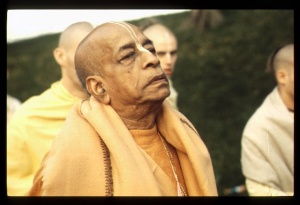SB 3.12.43: Difference between revisions
m (1 revision(s)) |
No edit summary |
||
| Line 1: | Line 1: | ||
{{info | {{info | ||
|speaker=Maitreya | |speaker=Maitreya Ṛṣi | ||
|listener=Vidura | |listener=Vidura | ||
}} | }} | ||
[[Category:Srimad-Bhagavatam - Canto 03 Chapter 12]] | |||
[[Category:Bhagavatam Verses Spoken by Maitreya Rsi - Vanisource|031243]] | |||
<div style="float:left">'''[[Srimad-Bhagavatam]] - [[SB 3|Third Canto]] - [[SB 3.12: Creation of the Kumaras and Others|Chapter 12: Creation of the Kumāras and Others]]'''</div> | |||
<div style="float:right">[[File:Go-previous.png|link=SB 3.12.42]] '''[[SB 3.12.42]] - [[SB 3.12.44]]''' [[File:Go-next.png|link=SB 3.12.44]]</div> | |||
{{RandomImage}} | |||
==== TEXT 43 ==== | ==== TEXT 43 ==== | ||
<div | <div class="verse"> | ||
vaikhānasā vālakhilyau- | :vaikhānasā vālakhilyau- | ||
dumbarāḥ phenapā vane | :dumbarāḥ phenapā vane | ||
nyāse kuṭīcakaḥ pūrvaṁ | :nyāse kuṭīcakaḥ pūrvaṁ | ||
bahvodo haṁsa-niṣkriyau | :bahvodo haṁsa-niṣkriyau | ||
</div> | </div> | ||
| Line 16: | Line 22: | ||
==== SYNONYMS ==== | ==== SYNONYMS ==== | ||
<div | <div class="synonyms"> | ||
''vaikhānasāḥ''—the section of men who retire from active life and live on half-boiled meals; ''vālakhilya''—one who quits his former stock of grains on receipt of more; ''audumbarāḥ''—one who lives on what he gets from the direction towards which he starts after rising from bed; ''phenapāḥ''—one who lives on the fruits which automatically fall from the tree; ''vane''—in the forest; ''nyāse''—in the order of renunciation; ''kuṭīcakaḥ''—life in the family without attachment; ''pūrvam''—in the beginning; ''bahvodaḥ''—giving up all material activities and engaging fully in transcendental service; ''haṁsa''—fully engaged in transcendental knowledge; ''niṣkriyau''—stopping all kinds of activities. | |||
</div> | </div> | ||
| Line 23: | Line 29: | ||
==== TRANSLATION ==== | ==== TRANSLATION ==== | ||
<div | <div class="translation"> | ||
The four divisions of retired life are the vaikhānasas, vālakhilyas, audumbaras and phenapas. The four divisions of the renounced order of life are the kuṭīcakas, bahvodas, haṁsas and niṣkriyas. All these were manifested from Brahmā. | The four divisions of retired life are the vaikhānasas, vālakhilyas, audumbaras and phenapas. The four divisions of the renounced order of life are the kuṭīcakas, bahvodas, haṁsas and niṣkriyas. All these were manifested from Brahmā. | ||
</div> | </div> | ||
| Line 30: | Line 36: | ||
==== PURPORT ==== | ==== PURPORT ==== | ||
<div | <div class="purport"> | ||
The varṇāśrama-dharma, or the institution of the four divisions and orders of social and spiritual life, is not a new invention of the modern age, as proposed by the less intelligent. It is an institution established by Brahmā from the beginning of the creation. This is also confirmed in the Bhagavad-gītā ([[BG 4.13]]): cātur-varṇyaṁ mayā sṛṣṭam. | The ''varṇāśrama-dharma'', or the institution of the four divisions and orders of social and spiritual life, is not a new invention of the modern age, as proposed by the less intelligent. It is an institution established by Brahmā from the beginning of the creation. This is also confirmed in the [[Bhagavad-gita As It Is (1972)|''Bhagavad-gītā'']] ([[BG 4.13 (1972)|BG 4.13]]): ''cātur-varṇyaṁ mayā sṛṣṭam.'' | ||
</div> | </div> | ||
__NOTOC__ | |||
<div style="float:right; clear:both;">[[File:Go-previous.png|link=SB 3.12.42]] '''[[SB 3.12.42]] - [[SB 3.12.44]]''' [[File:Go-next.png|link=SB 3.12.44]]</div> | |||
__NOTOC__ | |||
__NOEDITSECTION__ | |||
Revision as of 10:29, 5 May 2021

A.C. Bhaktivedanta Swami Prabhupada
TEXT 43
- vaikhānasā vālakhilyau-
- dumbarāḥ phenapā vane
- nyāse kuṭīcakaḥ pūrvaṁ
- bahvodo haṁsa-niṣkriyau
SYNONYMS
vaikhānasāḥ—the section of men who retire from active life and live on half-boiled meals; vālakhilya—one who quits his former stock of grains on receipt of more; audumbarāḥ—one who lives on what he gets from the direction towards which he starts after rising from bed; phenapāḥ—one who lives on the fruits which automatically fall from the tree; vane—in the forest; nyāse—in the order of renunciation; kuṭīcakaḥ—life in the family without attachment; pūrvam—in the beginning; bahvodaḥ—giving up all material activities and engaging fully in transcendental service; haṁsa—fully engaged in transcendental knowledge; niṣkriyau—stopping all kinds of activities.
TRANSLATION
The four divisions of retired life are the vaikhānasas, vālakhilyas, audumbaras and phenapas. The four divisions of the renounced order of life are the kuṭīcakas, bahvodas, haṁsas and niṣkriyas. All these were manifested from Brahmā.
PURPORT
The varṇāśrama-dharma, or the institution of the four divisions and orders of social and spiritual life, is not a new invention of the modern age, as proposed by the less intelligent. It is an institution established by Brahmā from the beginning of the creation. This is also confirmed in the Bhagavad-gītā (BG 4.13): cātur-varṇyaṁ mayā sṛṣṭam.